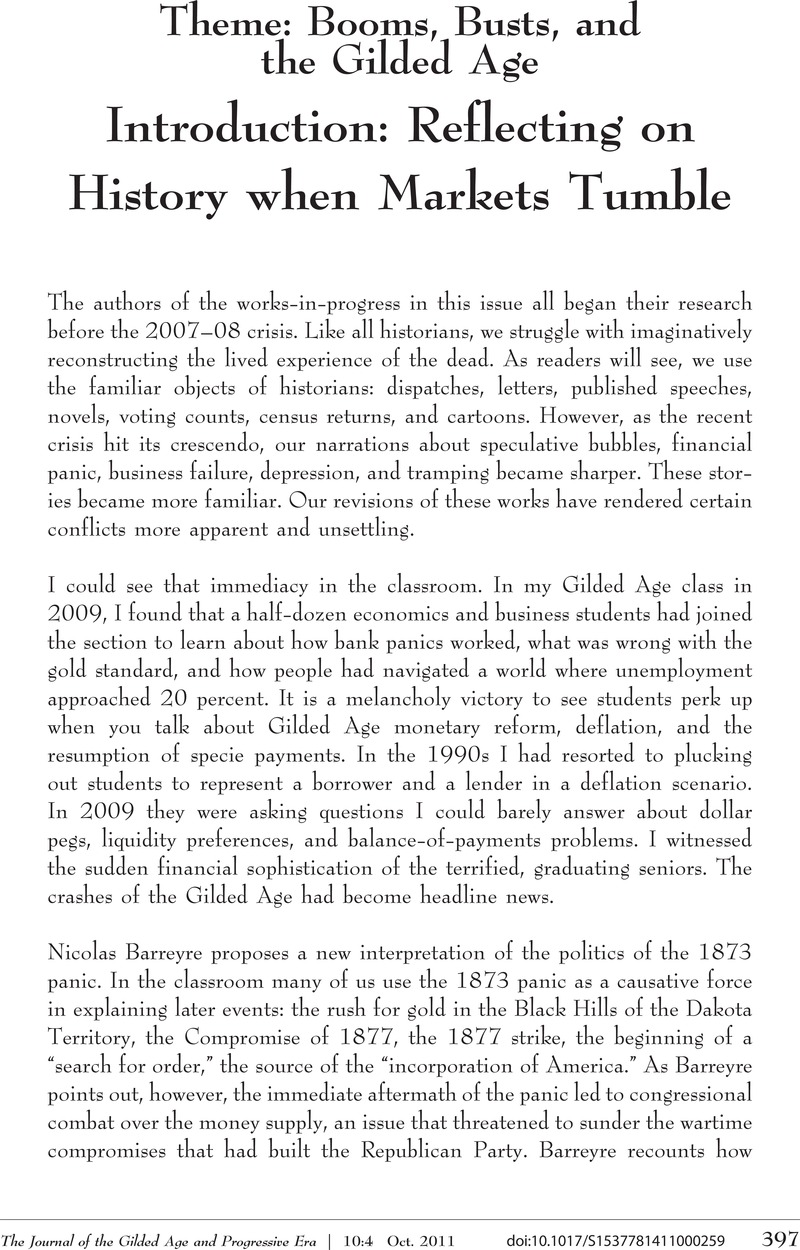Article contents
Introduction: Reflecting on History when Markets Tumble
Published online by Cambridge University Press: 28 September 2011
Abstract

- Type
- Theme: Booms, Busts, and the Gilded Age
- Information
- The Journal of the Gilded Age and Progressive Era , Volume 10 , Issue 4 , October 2011 , pp. 397 - 401
- Copyright
- Copyright © Society for Historians of the Gilded Age and Progressive Era 2011
References
1 Eisman bet that the housing bubble would collapse and made over a billion. Lewis, Michael, The Big Short: Inside the Doomsday Machine (New York, 2010)Google Scholar.
2 Karen Winkler at the Chronicle of Higher Education showed me how to track the hundreds of places the article reappeared around the world in 2008 using news.google.com. The article appeared in Peru (La Republica, Oct. 2), Spain (Cotizalia, Oct. 7), Montreal (Le Devoir, Oct. 8), South Korea (Hankyoreh, Oct. 10), Italy (Il Foglio, Oct. 15), Switzerland (Weltwoche, Oct. 15), Hungary (Portfolio, Oct. 13), and Greece (Elefthrotypia, Oct. 26). It appeared on “Underreported” by Leonard Lopate (WNYC, Oct. 16, 2008), along with radio shows in Ireland and New Zealand (Checkpoint Choice, Oct. 7). Sir Ronald Cohen of the newly formed European Private Equity and Venture Capital Association laid out my case in the inaugural meeting of that organization. See James Mawson, “Victorian Financial Crisis Provides Object Lesson on Current Turmoil,” Private Equity News, Oct. 27, 2008. A student organization called FHJ Factcheck pointed out that a front-page story in the Dutch business newspaper, Het Financieele Dagblad, “Huidige crisis lijkt verdacht veel op begin van Lange Depressie van 1873,” Oct. 24, 2008, plagiarized my article almost sentence-for-sentence, including the story that started with my grandmother: http://fhjfactcheck.wordpress.com/2008/11/03/pronkt-fd-journalist-met-andermans-veren/ (accessed February 3, 2011).
3 Fred Wilson of Union Square Ventures took “market cap less cash and divided by ‘operating cash flow’ from google finance” to predict that firms like Chrysler would do poorly whereas Google and Apple would hold value. See the widely commented “What to Look For Next” at http://www.avc.com/a_vc/2008/10/what-to-look-fo.html (accessed February 3, 2011). One of his investor-friends, Dror Gill, then wrote a song about it with the lines
Microsoft should buy more of its stock
Google as well, should get out of its shock
And if you're looking for more stocks to buy fast
Try Apple, Starbucks, Wallmart and Comcast.
There are many similarities that we can see
To the great panic in 1873
Which happened as America spread out to the world
And was won by big companies after the markets twirled.
See http://blog2song.blogspot.com/2008/10/what-to-look-for-next.html (accessed February 3, 2011). I still do not know what to make of all this. In the interest of full disclosure, I should point out that I do not and have not ever invested in the stock market. In August of 2007, however, I did move my family's retirement fund out of stocks and into bonds after I read that the European Central Bank was injecting 95 billion euros into the banks to get them to lend to each other. That reminded me of the Panic of 1873.
- 2
- Cited by




